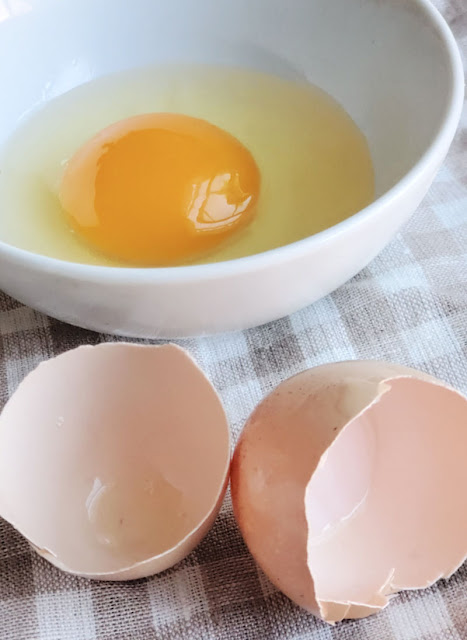Eggs are one of the best, and most affordable, sources of complete protein there is. They are packed with vitamins and nutrients, including Vitamin D and lutein.
Eggs are so versatile, called for in scads of recipes, both sweet and savory, and are quick to cook up.
But eggs are also the subject of various myths that simply aren't true. So today I'm going to debunk some of the most common myths I hear about eggs.
Top 12+ Common Myths about Eggs that Simply Aren't True
Myth #1 | Brown eggs are more nutritious than white eggs.
The reality is that the nutritional value of an egg is dependent on the diet of the chicken and the freshness of the egg. It has nothing to do with shell color. Brown and white eggs have the same calorie count, vitamins and nutrients, all things being equal.
Eggshell color is dictated by the breed of chicken, nothing more.
Myth #2 | A chicken's earlobe color or feather color dictates the color egg she lays.
This general rule of thumb can be true, but isn't in all cases. It's very simplistic to make that claim.
Although white Leghorns do lay white eggs, and brown Rhode Island Reds do lay brown eggs, I have chickens with white earlobes that lay blue eggs. I have black chickens that lay green eggs. I have gray chickens that lay tan eggs, and chickens with red earlobes that lay brown eggs, and so on...
Myth #3 | The color of the egg yolk indicates the quality of the hen's life.
This is a tough one because it can be true. The more of the carotenoid xanthophyll a hen eats, the darker orange her egg yolks will be. Nutritious foods like alfalfa, dandelions, basil, parsley, pumpkins, cabbage and leafy greens all make nice orange egg yolks in happy chickens eating a varied diet on a farm.
However, commercial feed companies add marigold and corn to their feed to boost the vibrancy of the yolks of the eggs their poor, caged hens lay.
Myth #4 | You need a rooster for hens to lay eggs.
I think the most common misconception when it comes to raising chickens is the idea the you need a rooster in your flock for your hens to lay eggs. Many urban and suburban areas are starting to allow small backyard flocks, however most limit the flocks to hens.
But no worries, your hens will happily lay an egg almost every day without a rooster. Those eggs will just never hatch into chicks.
Myth #5 | A blood spot in an egg means it's been fertilized.
Another misconception is that a blood spot in an egg means that it's been fertilized. That's incorrect. A blood spot in an egg is simply a ruptured blood vessel that broke while the egg was being formed.
In order to determine if an egg has been fertilized, you need to look for a white bulls eye on the egg yolk.
Myth #6 | Fertilized eggs are more nutritious than non-fertilized eggs.
Definitely not true. A fertilized egg and a non-fertilized egg are identical in every way, except for the bulls eye on the yolk I mentioned in the previous section - and a tiny bit of rooster DNA.
Myth #7 | Rounded eggs will hatch into hens; pointy eggs will hatch into roosters.
This claim has been going around the internet for years. There is no validity to it unfortunately. Some hens just lay pointy eggs, other lay rounded eggs.
If it were possible to tell the "sex" of an egg before it hatches, hatcheries wouldn't have all those extra little roosters to get rid of that no one wants.
Myth #8 | All eggs contain salmonella.
While eating raw or uncooked eggs is one of the more common ways to contract salmonella, it's estimated that only about 1 in 20,000 eggs is actually contaminated with salmonella.
And fully cooking an egg will kill the salmonella bacteria.
Myth #9 | Eggs need to be refrigerated.
Although store bought eggs in the United States, which have been cleansed before being put in the carton and shipped to your grocery store, do need to be refrigerated, fresh eggs from a backyard flock or farmers market that haven't been washed can be left out at room temperature for several weeks.
When an egg is laid, an invisible coating called the "bloom" is applied to the outer shell which works to keep out air and bacteria, keeping that egg fresher longer than an egg that has been washed. Fresh eggs should be washed just before cooking them.
Myth #10 | Fresh eggs are impossible to peel.
Myth #11 | If an egg floats, it's not safe to eat.
Myth #12 | Eggs should be cracked on the side of a bowl.
Myth #13 | It's healthier to just eat the whites of an egg.










